Overview
Benefits of Creatine are numerous as the most researched bodybuilding supplement of all time. It is a molecule found in skeletal muscle and used as an energy source for cells. It can be stored in the form of phosphocreatine and provide a crucial boost to the cellular reaction cycle. Creatine is a natural supplement comprised of three amino acids (arginine, glycine, and methionine), has been found to increase production of ATP (adenosine triphosphate), the cell’s main energy source. The benefits are several and discussed in this article.
Creatine supplements are used to help replenish the store of phosphocreatine in muscle tissues. A cell’s phosphocreatine stores are important for generating energy, especially during intense physical activity. Oral supplementation has been found to increase the level of phosphocreatine in muscle cells by up to 30% after four days of intake.
Creatine is a supplement that is often used by athletes to increase their muscle mass. It does this by increasing production of adenosine triphosphate, also known as ATP. A recent study has shown that it can increase ATP production by up to 20%. This means that with less effort, you can get the same results.
Abstract: A review of creatine supplementation in age-related diseases: more than a supplement for athletes
Creatine is an endogenous compound synthesized from arginine, glycine and methionine. This dietary supplement can be acquired from food sources such as meat and fish, along with athlete supplement powders. Since the majority of creatine is stored in skeletal muscle, dietary creatine supplementation has traditionally been important for athletes and bodybuilders to increase the power, strength, and mass of the skeletal muscle.
However, new uses have emerged suggesting that it may be important in preventing or delaying the onset of neurodegenerative diseases associated with aging. On average, 30% of muscle mass is lost by age 80, while muscular weakness remains a vital cause for loss of independence in the elderly population. In light of these new roles of creatine, the dietary supplement’s usage has been studied to determine its efficacy in treating congestive heart failure, gyrate atrophy, insulin insensitivity, cancer, and high cholesterol. In relation to the brain, creatine has been shown to have antioxidant properties, reduce mental fatigue, protect the brain from neurotoxicity, and improve facets/components of neurological disorders like depression and bipolar disorder.
The combination of these benefits has made creatine a leading candidate in the fight against age-related diseases, such as Parkinson’s disease, Huntington’s disease, amyotrophic lateral sclerosis, long-term memory impairments associated with the progression of Alzheimer’s disease, and stroke. In this review, we explore the normal mechanisms by which creatine is produced and its necessary physiology, while paying special attention to the importance of creatine supplementation in improving diseases and disorders associated with brain aging and outlining the clinical trials involving creatine to treat these diseases.
@article{Smith2014ARO, title={A review of creatine supplementation in age-related diseases: more than a supplement for athletes}, author={Rachel N. Smith and Amruta S. Agharkar and Eric B Gonzales}, journal={F1000Research}, year={2014}, volume={3} }
Benefits of Creatine Include:
- – Increased muscle mass
- – Improved performance in high intensity exercise
- – Reduced fatigue
- – Improved cognitive function
- – Reduced risk of injury
- -Increased bone density
- -Anti-Aging
- -Increased ATP production
- -May Aid in Muscular Dystrophy
- -May Aid in Treating Parkinson’s Disease
- -Helps Fight Neurological Diseases
- -Can Help in Treating Depression
- -May Have Cardioprotective Effects
- -May Help in Regulating Blood Sugar
Benefits Include Increased ATP Energy Production
In a study by Timmons and colleagues, supplementation in healthy adults resulted in increased serum levels of creatine. In addition, the supplemented group experienced a significant increase in ATP production by up to 54%. The increase in ATP production for this group could be attributed to an increased amount of muscle mass and enhanced muscle function, which allows the body to produce more atp.
Benefits include improved mitochondrial health and reduced fatigue. The creatine molecule can provide extra phosphate groups for the production of ATP, the body’s main energy source. After this process is complete, creatine can be converted into phosphocreatine for storage and later use as an immediate energy source. Creatine is thought to help increase the number of active mitochondria in the muscle cells, helping to prevent oxidation from occurring within them.

House Cleaning Dead Senescent Cells
In a recent study published in the journal, Nature Cell Biology, it was found that creatine can help to reduce senescent cells. Senescent cells are cells that have stopped dividing and begin to produce a chronic inflammatory signal. This chronic inflammation can lead to many harmful effects such as accelerated aging, increased incidence of cancer, organ dysfunction, and even death. Researchers found that when they added creatine to cell cultures with senescent cells, it lowered these harmful effects.
Supplements that compliment and magnify the benefits of creatine include beta-alanine, caffeine, L-arginine, betaine, and choline. It is a supplement that helps supply energy to muscle cells by producing phosphocreatine. The production of phosphocreatine provides ATP for the muscles when they need it most during periods of increased activity.
The Original Creatine Monohydrate is Still Preferred
Creatine monohydrate is more bioavailable than other forms which makes it the best choice for supplementation. However, too much can also be harmful and cause stomach bloating. The recommended dose for a healthy adult is 5 grams per day with initial loading phase of 20 grams per day for five days. This loading phase saturates the cells and shortens the time by up to six weeks over non loading protocol.
It is very important to stay hydrated as it works by drawing water into muscles.
Beyond bodybuilding and muscle growth, there is considerable research and evidence that the benefits of creatine supplementation are excellent for seniors and those who wish to boost their energy and overall vitality.
DIY supplements – make your own creatine capsules
Take our health assessment quiz here!












